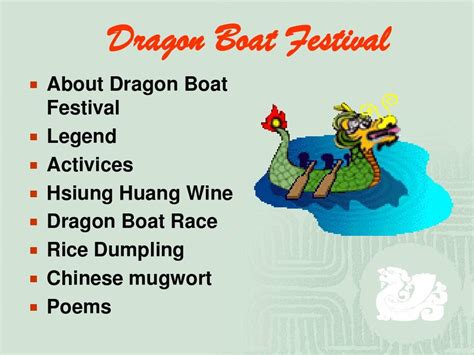端午节的由来用英语介绍
The Origin of Dragon Boat Festival
The Dragon Boat Festival, also known as Duanwu Festival, is a traditional Chinese holiday celebrated on the 5th day of the 5th month of the lunar calendar. This festival has a rich history and cultural significance deeply rooted in Chinese tradition.
Historical Background:
The Dragon Boat Festival commemorates the death of Qu Yuan, a famous poet and minister in ancient China. Qu Yuan lived during the Warring States period, around 340278 BC, in the state of Chu. He was a loyal and patriotic official who served his kingdom faithfully. However, he was slandered by corrupt officials and eventually exiled by the king.
Qu Yuan's Sacrifice:
During his exile, Qu Yuan wrote many poems expressing his love for his country and his sorrow at its downfall. Legend has it that when Qu Yuan learned of the fall of his beloved Chu state to the Qin armies, he was overcome with grief and threw himself into the Miluo River, clutching a heavy stone to his chest.
Dragon Boat Racing:
To prevent fish and evil spirits from consuming Qu Yuan's body, villagers raced out in their boats to scare them away and retrieve his body. They beat drums and splashed their oars in the water to keep the creatures at bay. This tradition of dragon boat racing, accompanied by the eating of Zongzi (traditional sticky rice dumplings) and the hanging of calamus and moxa leaves, has continued ever since.
Significance of Zongzi:

Zongzi plays a central role in the Dragon Boat Festival celebrations. These pyramidshaped dumplings are made of glutinous rice stuffed with various fillings such as pork, beans, or dates, and wrapped in bamboo leaves. They are then steamed or boiled until cooked. The tradition of eating Zongzi is said to originate from the villagers throwing rice into the river to distract the fish from Qu Yuan's body. Over time, the rice became wrapped in leaves to form Zongzi.
Customs and Traditions:
Apart from dragon boat racing and eating Zongzi, the Dragon Boat Festival also features other customs and traditions. These include wearing perfume pouches, hanging mugwort and calamus leaves around the house to ward off evil spirits, and standing eggs on their ends at noon as it is believed to bring luck and prosperity.
Modern Significance:
Today, the Dragon Boat Festival is celebrated not only in China but also in many other parts of the world. It has become a symbol of Chinese culture and heritage, promoting unity, teamwork, and the spirit of sacrifice. Dragon boat racing has evolved into a competitive sport, attracting participants and spectators from all walks of life.
In conclusion, the Dragon Boat Festival is a timehonored tradition that commemorates the life and sacrifice of Qu Yuan, while also promoting unity and cultural heritage. Through dragon boat racing, Zongzi eating, and various customs, people pay tribute to their ancestors and strengthen bonds within their communities.
Suggestions for Celebration:
1.
Participate in Dragon Boat Racing:
Join a local dragon boat racing event to experience the thrill of this traditional sport and foster teamwork and camaraderie.2.
Make Zongzi:
Learn how to make Zongzi at home with family and friends, following traditional recipes passed down through generations.3.
Learn About Chinese Culture:
Take this opportunity to delve deeper into Chinese history and culture by reading about the legend of Qu Yuan and the customs associated with the Dragon Boat Festival.4.
Attend Cultural Events:
Explore local cultural events and exhibitions related to the Dragon Boat Festival to gain a deeper understanding of its significance and relevance in modern times.5.











